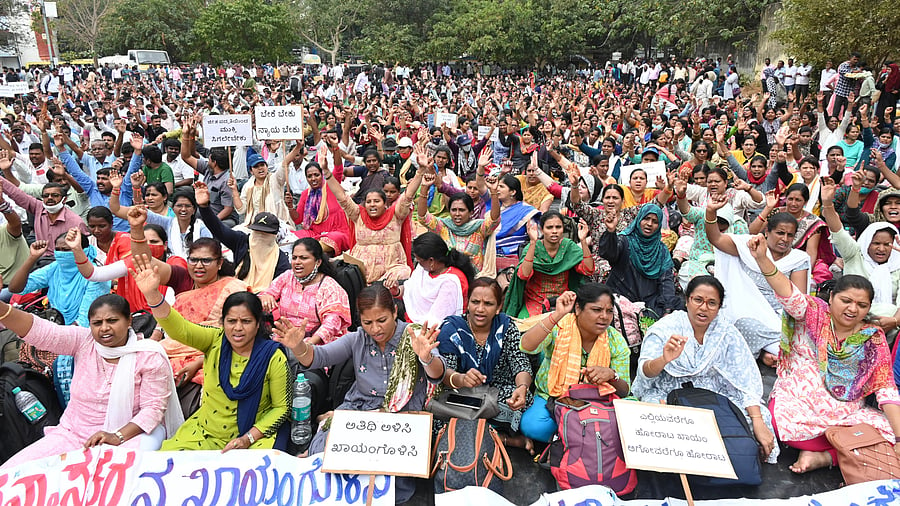
Credit: Special Arrangement
The guest faculties’ issue in government degree colleges seems like it’s never ending.
Though the government recently decided to continue them for the current semester, this is a ‘temporary’ arrangement and will not stand in court, say the guest faculties.
Previous governments too endured a series of protests by guest faculties, which affected academic activities severely.
Legal challenges
The thorn in the flesh is the conflict between the government’s reliance on experienced, but non-UGC-qualified faculty and the High Court’s recent orders to the government to strictly adhere to University Grants Commission (UGC) qualification norms for appointments.
This has led to uncertainty for over 5,500 guest faculties with decades of experience.
Despite the court asking the government to stick to UGC-prescribed regulations while appointing guest faculties, the latter issued an order to continue the services of guest faculties for the current semester and to submit the same to the court on October 8, during the next hearing.
Guest faculties are of the opinion that the court may not accept the government’s submission.
“The decision to extend the services of guest faculties is contrary to the court orders. The court has clearly asked to appoint only those that fulfill UGC- prescribed qualifications. In case of non-availability of qualified candidates for some subjects, it can consider guest faculties only for such subjects. We don’t think the court will accept the government order and we will again be in trouble,” said an office bearer of the Karnataka state government degree college guest faculties’ association.
The concept of guest faculties did not exist in the state till 2003, when the government withdrew the concept of ‘part time’ teachers and introduced ‘guest faculties,’ which means, they will be treated as ‘guests’ and given a job where there is workload and only for a period of 10 months with a fixed honorarium every month.
Even that was not an issue till 2006-07. When H D Kumaraswamy was chief minister, he sanctioned over 180 government degree colleges and this led to demand for guest faculties. Even now, a majority of the degree colleges depend on guest faculties.
Though recruitments were done thrice to fill vacant posts, it did not cater to the workload.
“Even though the government did recruitments in the past, the posts filled were a few thousands. Even after that over 11,000 guest faculties are working. We cannot say recruitments will resolve the issue,” said Shivappa C, an office bearer of the association. The number of regular faculties in government-run degree colleges (numbering 430) is lower, at 6,500.
Some colleges run only with guest faculties. During BJP’s tenure, the then higher education minister Dr C N Ashwath Narayan increased the honorarium based on experience and qualification of guest faculties.
The honorarium almost doubled. Until then, they were paid Rs 15,000 per month.
The BJP government had constituted a committee to submit recommendations to resolve the guest faculties’ issues. It was headed by then additional chief secretary of the higher education department G Kumar Naik and comprised officials from the finance department. The report of the committee is not made public.
Guest faculties say they will be happy if the government notifies regular recruitment for all vacant posts and for vacancies created against retirement and by increasing the sanctioned posts.
“If that happens, a majority of the qualified guest faculties will enter the system and there will be no need to hire guest faculties. The problem is while issuing notification, the government only considers existing vacancies. If that is the case, the problem will never get resolved,” said a member of the guest faculties’ association.
It all started in 2018
The guest faculties were working with the government since 2003 and everything went well till 2018, when the UGC mandated that only candidates with specific qualifications (NET, KSET or PhD) could be appointed as guest faculties.
Even after this, the government continued to appoint guest faculties without prescribed qualifications. This triggered candidates who are eligible to get appointed, but not given opportunity as the government was giving points/weightage for the existing ones based on experience, leading to a legal battle.
Higher Education Minister Dr M C Sudhakar said, “If we stick to UGC norms, we will not have faculties for a few subjects as there are no candidates with UGC-prescribed qualifications to teach these subjects. We have informed this to the court also”.
